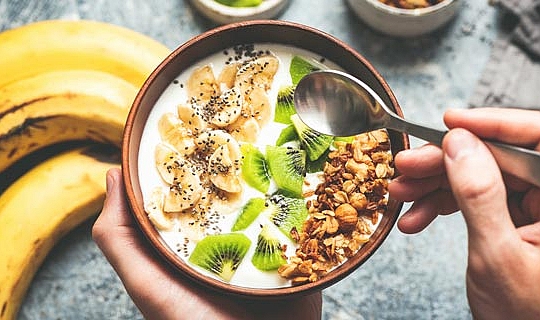What is a gluten-free diet?
A gluten-free diet is a term for people who have to follow a gluten-free diet because of celiac disease or gluten intolerance. These people cannot eat these foods because grains such as wheat, barley, rye and oats contain gluten. A gluten-free diet requires avoiding all gluten-containing foods.Basic rules for a gluten-free diet
When following a gluten-free diet, it is important to consume gluten-free foods. This requires considering gluten-containing ingredients in prepared foods as well as gluten-containing grains. Some foods may even contain gluten in unexpected places, such as soups, sauces, and ready-made desserts. That's why it's important to read nutrition labels and choose gluten-free foods.What are gluten-free foods?
Gluten-free foods include foods such as meat, fish, chicken, eggs, fruit, vegetables, rice, corn, potatoes, beans, chickpeas, lentils, soybeans and cornmeal. Gluten-free diets may also include alternatives such as gluten-free grains, rice flour, potato starch, cornstarch, chickpea flour, soybean meal, and bean meal.Health benefits of a gluten-free diet
A gluten-free diet is essential for people with celiac disease or gluten intolerance. When these people eat gluten, the intestinal wall is damaged and they experience digestive system problems. However, there are other health benefits of a gluten-free diet as well. Some studies show that a gluten-free diet can reduce inflammation and reduce digestive problems by improving gut health. In addition, the gluten-free diet can be used to relieve symptoms of autism, schizophrenia, and other neurological conditions.Disadvantages of a gluten-free diet
A gluten-free diet can be limiting for some people and may taste less appealing to others than other foods. Many gluten-free foods are more expensive, and following a gluten-free diet can increase the risk of nutrient deficiencies. Therefore, it is important to consult a doctor before following a gluten-free diet.What should be considered when eating gluten-free?
Following a gluten-free diet is not limited to just choosing gluten-free foods. You also need to consider other ingredients in prepared foods. Those following a gluten-free diet should pay attention to the following issues:
Those with gluten intolerance or celiac disease may have to follow a gluten-free diet. It is possible to maintain a healthy and balanced diet by diversifying the gluten-free diet with gluten-free grains, vegetables, fruits and other alternative foods. Reading food labels, eating out, exploring alternative grains, choosing gluten-free snacks, and using vitamin and mineral supplements are all important tips on what to consider when following a gluten-free diet.Frequently Asked Questions
A gluten-free diet is a term for people who have to follow a gluten-free diet because of celiac disease or gluten intolerance. These people cannot eat these foods because grains such as wheat, barley, rye and oats contain gluten. A gluten-free diet requires avoiding all gluten-containing foods.Basic rules for a gluten-free diet
When following a gluten-free diet, it is important to consume gluten-free foods. This requires considering gluten-containing ingredients in prepared foods as well as gluten-containing grains. Some foods may even contain gluten in unexpected places, such as soups, sauces, and ready-made desserts. That's why it's important to read nutrition labels and choose gluten-free foods.What are gluten-free foods?
Gluten-free foods include foods such as meat, fish, chicken, eggs, fruit, vegetables, rice, corn, potatoes, beans, chickpeas, lentils, soybeans and cornmeal. Gluten-free diets may also include alternatives such as gluten-free grains, rice flour, potato starch, cornstarch, chickpea flour, soybean meal, and bean meal.Health benefits of a gluten-free diet
A gluten-free diet is essential for people with celiac disease or gluten intolerance. When these people eat gluten, the intestinal wall is damaged and they experience digestive system problems. However, there are other health benefits of a gluten-free diet as well. Some studies show that a gluten-free diet can reduce inflammation and reduce digestive problems by improving gut health. In addition, the gluten-free diet can be used to relieve symptoms of autism, schizophrenia, and other neurological conditions.Disadvantages of a gluten-free diet
A gluten-free diet can be limiting for some people and may taste less appealing to others than other foods. Many gluten-free foods are more expensive, and following a gluten-free diet can increase the risk of nutrient deficiencies. Therefore, it is important to consult a doctor before following a gluten-free diet.What should be considered when eating gluten-free?
Following a gluten-free diet is not limited to just choosing gluten-free foods. You also need to consider other ingredients in prepared foods. Those following a gluten-free diet should pay attention to the following issues:
- Read food labels
- Be careful when eating out
- Discover alternative grains
- Choose gluten-free snacks
- Use vitamin and mineral supplements
Those who follow a gluten-free diet may be at risk of nutrient deficiencies. Therefore, taking vitamin and mineral supplements is important for maintaining a healthy diet. A doctor or dietitian can advise on which supplements to take.
Those with gluten intolerance or celiac disease may have to follow a gluten-free diet. It is possible to maintain a healthy and balanced diet by diversifying the gluten-free diet with gluten-free grains, vegetables, fruits and other alternative foods. Reading food labels, eating out, exploring alternative grains, choosing gluten-free snacks, and using vitamin and mineral supplements are all important tips on what to consider when following a gluten-free diet.Frequently Asked Questions
- What are the disadvantages of a gluten-free diet?
- What are gluten-free foods?
- What is a gluten-free diet?


















